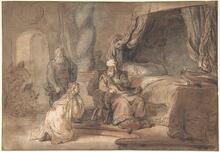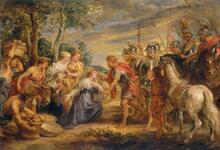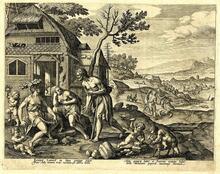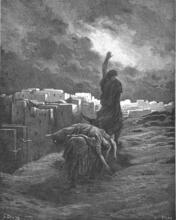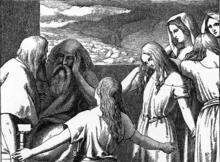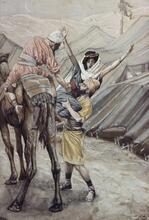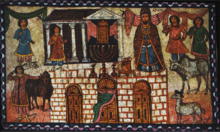Abishag: Midrash and Aggadah
"Batsheba Bringing Abishag to David," by Richard Earlom, 1779. From the Yale Center for British Art, via Wikimedia Commons.
Abishag’s story in the Bible shows her strength and independence, as she insists David marry her and rebukes his answer when he refuses. Some midrashim use her story to show the tenacity of David in his old age, but she is not explicitly interpreted as wicked or deceitful. Beyond her story with David, Abishag is described as having beauty is comparable to the Matriarchs.
Article
Abishag is described in Rabbinic literature as a woman possessing self-respect and a mind of her own, who is not deterred from confronting King David himself. The Lit. "teaching," "study," or "learning." A compilation of the commentary and discussions of the amora'im on the Mishnah. When not specified, "Talmud" refers to the Babylonian Talmud.Talmud (BT Sanhedrin 22a) relates that she did not wish to remain with the problematic status of a maiden who is alone with the king but is not married to him. She therefore demands that David take her as a wife. The king refuses, on the pretext that the king is forbidden to have an excessive number of wives. (David already had eighteen wives; according to the Codification of basic Jewish Oral Law; edited and arranged by R. Judah ha-Nasi c. 200 C.E.Mishnah [Sanhedrin 2:4], this is the maximal number of wives permitted to a king.) Abishag does not accept the monarch’s reply and challenges him with the proverb “When the thief has nothing to steal, he becomes virtuous”—in plain language: you are old and impotent, and so you claim that I am forbidden to you.
Abishag thereby seemingly alludes to the episode of Bathsheba, in which David had no qualms about transgressing the laws of the Torah she-bi-khetav: Lit. "the written Torah." The Bible; the Pentateuch; Tanakh (the Pentateuch, Prophets and Hagiographia)Torah, but had relations with a married woman and engineered her husband’s death. But now, since his desire has waned, he proclaims that he is the guardian of the Torah’s strictures. In order to prove to Abishag that this is not so, David, in Abishag’s presence, calls Bathsheba to him and demonstrates that he is still at the peak of his sexual prowess. He thereby proves to her that the primary reason for his refusal is the limitations imposed on the king. This A type of non-halakhic literary activitiy of the Rabbis for interpreting non-legal material according to special principles of interpretation (hermeneutical rules).midrash, in contrast with the Bible, uses the character of Abishag in order to strengthen the image of the aged David: he is depicted as someone whose sexual vigor has not waned and as someone who can withstand the temptations of his Evil Urge by being alone with a beautiful woman such as Abishag without complying with her wishes, because of his desire to obey the Torah.
Abishag’s beauty is compared with that of the Matriarchs. She was as comely as Eve but possessed only half the beauty of Sarah (Apocalypse of Sedrach 7). Rebekah, too, was more beautiful than she (Midrash ha-Gadol, Gen. 1, p. 397). According to Pirkei de-Rabbi Eliezer (ed. Higger, chap. 22), Abishag was the sister of the Wise Woman from Shunem. Another source (Gen. Rabbati, Hayyei Sarah, 100–101) lists her among the twenty-two worthy women in the world.
Curzon, David. Modern Poems on the Bible: An Anthology. Jewish Publication Society, 1994, 209-214.
Koplowitz-Breier, Anat. "Biblical/Modern Intergenerational Conflict: Four Modern German Poets on “Abishag the Shunammite”." Neohelicon 42, no. 2 (2015): 585-602.
Koplowitz-Breier, Anat. "The Power of Words: The Biblical Abishag in Contemporary American Jewish Women’s Poetry." Studies in American Jewish Literature (1981-) 37, no. 1 (2018): 21-36.


